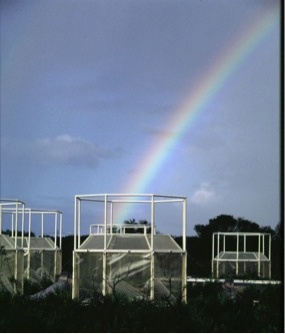We can't count on plants to slow down global warming
Posted on 9 May 2014 by John Abraham
Increased future plant growth will not reduce carbon dioxide levels in the atmosphere as much as we thought; so finds a new study published in Science. This means that we will not have that get-out-of-jail-free card that some of us were counting on.
For some background, it is clear that in some cases, increasing carbon dioxide in the atmosphere can stimulate plant growth. It makes sense that this plant growth would help pull carbon dioxide out of the atmosphere, buying us some time to get our act in order to reduce pollution.
According to the study,
“Earth system models project that rising atmospheric CO2 will promote carbon uptake by the terrestrial biosphere (plants). The resulting increase in carbon stocks in plant biomass and soil organic matter would slow the rise in atmospheric CO2 concentrations and may help to slow climate change.”
The authors note that many experiments have shown the increased CO2 usually helps stimulate photosynthesis and plant growth. Some of this extra CO2 ends up in the soils where it is unable to participate as a greenhouse gas.
 Soil-carbon test locations, Cape Canaveral, Florida. Photograph: Bert G. Drake
Soil-carbon test locations, Cape Canaveral, Florida. Photograph: Bert G. Drake
The current authors went a step further though. They asked what happens to the carbon after it is in the soils. We know that microbes decompose soil matter and thereby release the carbon back to the air. Will this process increase, decrease, or stay the same as the climate warms and climate change progresses? It is important because soil stocks (the amount of carbon contained in soil) is determined by a balance between the influx and outflux of carbon.
The authors found that increased CO2 in the atmosphere actually increased the outflux of carbon dioxide from the soils. That is, it increased the rate of decomposition. In the long run, the increases in influx and outflux will essentially balance out. This suggests that there will be little help from the biosphere for us humans – plants will not take up our emissions.
The authors have two competing hypotheses behind the physical mechanisms that drive the decomposition. They told me that it is possible the plants close their stomata (the tiny pores which allow water and CO2 to pass into and out of leaves). As the stomata close, the soils become wetter and microbial activity increases. The authors also think that as atmospheric CO2 increases, soil microbes respond by decomposing older soil carbon. They call this a “priming effect” which is a natural buffering mechanism that slows carbon accumulation in soils.
Author Dr. Bruce Hungate from the Center for Ecosystem Science and Society told me,































 Arguments
Arguments






























Among the many interesting sociological studies to be on the online response to climate change stories, I think there may be an interesting investigation to be done into the types of stories which don't attract comments. This is a data stream which is missed by more typical studies. (As an extra bonus, the ethics approval would be very simple).
I'm always puzzled by those who claim plants will save us by taking up CO2. If that were true it would already have happened, while CO2 was still at levels that didn't saturate uptake by Rubisco. The current increase of CO2 was happening despite the fact that, up to this point, photosynthesis was still sensitive to CO2.
In that same vein, this finding may be a good thing going forward, or at least less than bad thing. If CO2 were stimulating carbon sequestration previously, we could not expect that level of sequestration to continue to keep pace with CO2. That would mean a possible decline in sequestration and an increase in the airborne fraction in the future.
Now it appears that that sequestration was never happening in the first place...or at least not much. So that means were are not likely to get surprise increases in the airborne fraction in the future, at least not from this source.
"Rising CO2 levels threaten human nutrition, study says" CBC News. "Iron and zinc levels were found to be much lower in some vital crops grown under future carbon dioxide scenarios". I've forgottern whether I only heard this on CBC or whether I also read it here on some post and I'm just repeating it back to you. Crops for nutrition and sequestering of carbon in vegetation are distinct topics of course, but somewhat related. I'd never thought of this nutritional content aspect.